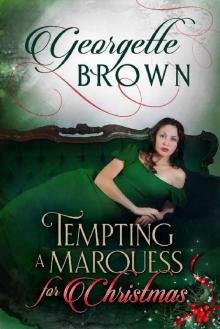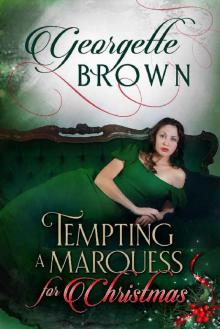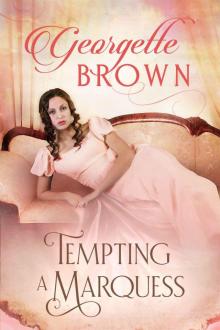- Home
- Georgette Brown
The Countess and the Rake: A Super Hot Historical Romance Page 2
The Countess and the Rake: A Super Hot Historical Romance Read online
Page 2
Dear bodkins. She stared at the molded buttocks. Naked, his arse was even more inspiring. Shaking her head, she forced herself to concentrate on the task at hand. She was Lady Athena, about to discipline an unruly boy.
Taking a deep breath, she backhanded one arse cheek with the crop. He did not flinch. She landed another on the other cheek. Still no movement from him.
“My lady, those blows are mere tickles compared to what I have endured as a boy,” he said.
Gathering her strength, she dealt him three successive whacks in the same spot. This time she heard a small grunt. Even in the dim lighting, she could see the faint mark of where the crop had struck. She wanted to reach out and touch him there, caress his arse, perhaps even plant a kiss.
“Better,” he complimented. “But still fairly weak.”
Swallowing a growl of frustration, she struck him again, and again, and again, hoping the rhythm would diffuse the strange effect she was experiencing. But the vigorous spanking did not excise her disconcertion. On the contrary, she felt more flustered. Although he seemed to grip the table more tightly, he displayed little evidence of the sensations he must be feeling. The only one who seemed to be out of sorts was her. Her exertion made her breath uneven, and the sight of his body taking all she gave had only caused her to flush more intensely.
Not knowing quite how to proceed next, she adjusted her mask and told him to don his breeches. “We are done. For tonight.”
The words were out her mouth before she had proper time to consider what she said. Though she had thought to be done with him, she was curious to see if he would return chastened. After buttoning the breeches, he stood erect, his posture emphasizing his broad shoulders.
“Thank you, Lady Athena.”
She nodded even though he faced away from her. The ensuing silence made her agitate her crop against her thigh. She let out a deep breath. “You will return two nights hence to this space. If I do not find you here waiting for me by ten o’clock, I am done with you.”
He turned around to give her a bow. “I am your servant, Lady Athena, and will do all that you bid.”
She strode out, not daring to glance back. She hoped he would not return.
Chapter Two
THE STRIDENT VOICE of Dowager Lowry transcended the stairs as if she meant to call to someone on the second floor instead of speaking to her son in the drawing room where she waited. “I do hope your wife has not selected that dreadful gown of peach for the Bennington ball. Peach is not a becoming color upon her.”
Standing alone at the top of the stairs, Gertie glanced down upon the gown of peach she wore. With her dark brown curls and pale complexion, she had thought the pastel an appropriate color for herself. The satin gown with its layered lace ruffles at the elbows was one of her favorites to start the Season. She wore it with matching slippers and had labored to find the best among her jewelry to accent her attire, finally settling on her garnet set. Despite her impatience, she had allowed the coiffeuse to produce curl after curl in a meticulous attempt to create the Merveilleuse. For a brief moment, Gertie considered donning another gown, but they were late for the Bennington ball as it was, and she had the suspicion that the most perfect gown would not meet the approval of the Dowager.
“Or that horrid gown of lavender she wore to the Wempole garden party,” Sarah Farrington, her sister-in-law, added.
“Then why do you not impart your sensibilities to her?” Gertie heard her husband retort with irritation. “Instead you allow me to appear at these events with an unflattering wife.”
“I protest. I have made such an attempt, but alas, it has proven futile.”
Gertie recalled Sarah’s one endeavor. Her sister-in-law had reviewed her wardrobe, sniffing at the mediocrity of certain articles and explaining how each gown was unsuited for a woman of her shape and features before declaring the whole effort to be quite fatiguing and that surely it was time for tea? Gertie would have gladly taken any guidance from her sister-in-law for Sarah was a beauty of the first order and followed all the latest fashion plates in The Lady’s Magazine.
“Her arms appear to have grown in thickness,” Dowager Lowry disapproved. “I hope you have cautioned her, Alexander, against indulging her appetite too much.”
Weary of overhearing more criticisms from her in-laws, Gertie made her entrance into the drawing room. Three pairs of eyes looked her over from head to toe. Alexander and his mother frowned while Sarah smirked upon seeing the gown of peach. Gertie was well aware that she was the ugly duckling among the statuesque Farringtons. Though she knew the Earl to have born more affection for her dowry than her person, she had considered herself fortunate to have acquired a husband who had such fine features. With only a modest countenance and a plump figure, Gertie had been convinced she could only marry a skinny freckled young man or a corpulent wizened man with a gout ailment. Alexander with his golden locks, fair skin, and high cheekbones had appeared a dashing prince.
They had been married three years. The fairy tale had withered soon after the vows were spoken. The wedding night had not been as amorous and tender as she had anticipated. In looking back, Alexander seemed to have bedded her more out of duty than any true desire for her. Nevertheless, her corporal passions had come to life. Her hopes for any intimacy with her husband, however, faded when he ceased to seek her bed some six months after their wedding.
Alexander narrowed his eyes at the gown of offense. “Shall we increase your allowance, Gertie, that you may procure a suitable ball gown?”
He asked for the benefit of his mother for he knew the answer. Alexander had squandered the largesse of the dowry and inheritance, most of it upon procuring a new coach-and-four and a house in Berkeley Square—though he considered Grosvenor Square a more fitting address for an Earl—and the remainder at dice, horses, and pugilism. His flippancy with all matters monetary had led his steward to begin consulting with his wife, whom they discovered had a decent head for figures and possessed more common sense. His distaste for such responsibilities trumped his pride, and Alexander was content to have his wife oversee the handling of the estate and household economy, provided he had access to funds when he needed them.
“Perhaps we ought to consider a new dressing maid,” Sarah added, raising two perfectly arched brows in her continued inspection of Gertie. “Jane has not done a proper job of disguising the shadows beneath your eyes.”
During the first year of her marriage to Alexander, the criticisms from her sister-in-law came in the form of poorly conceived flattery—a la “the bonnet you wear today is much more flattering than the one you wore yesterday.” Sarah made no effort nowadays to temper her contempt. Gertie allowed that such a beauty as Sarah must easily find fault in lesser mortals and had once quipped to a friend that Sarah should be glad that her splendor shined all the more when standing beside her plain sister-in-law. The angels had blessed Sarah Farrington with locks made from the sun’s rays, a swan-like neck, dainty feet and wrists so slender they equaled those of a child. Her nose, like her mother’s, was perhaps too sharp in profile, but apart from that, she was flawless.
“Perhaps a little more powder then?” Gertie replied, attempting to view herself in a mirror on the opposite wall.
“We have delayed long enough,” Alexander said with impatience.
Sarah had exceptionally discerning eyes, Gertie reassured herself as the Farringtons stepped into their carriage. Jane had received specific instructions to blend away the shadows—the result of an unfortunate series of events from the night before. Even now Gertie felt a warm discomfort as she recalled him. Hephaestus she had dubbed him, but the name had done little to achieve what she had hoped. Never had a visit to Madame Botreaux’s proven so unsatisfactory. She had been in fine form until he had appeared.
The night had progressed from bad to worse when, upon arriving to Lowry House last night, she had discovered that the portico she kept ajar for her surreptitious return had been shuttered. She had stood outside in the
dark of night for what seemed like hours contemplating her options. She could knock on the door and wake the servants, perhaps explaining that she had gone for a walk to quiet a restless night, but that would not clarify how the door came to be locked after her. She finally remembered that she had left the window of her bed chamber ajar. She had successfully climbed the vines to reach the balcony of her chambers, but only after scraping a knee and losing a slipper to the bushes below.
“The Henshaws announced the birth of child—a boy,” remarked Dowager Lowry as their carriage veered onto Bourdon Street. “The Duchess had been rather apprehensive that Elizabeth would not produce an heir, but I had assured her that her daughter would fulfill her responsibility.”
Gertie stared into her hands. She felt the pointed gaze of the Dowager. The Dowager never failed to announce a birth of note—one would have thought her the bloody Times—to underscore the fact that she had no grandchild. Gertie felt Alexander shift beside her. She had once told her mother-in-law, despite the delicacy of the matter, that it was not for want of trying. In truth, as much as she dreaded the conjugal act with her husband, she would have liked nothing more than to cradle a babe of her own. Alexander, however, seemed to have lost interest in the past twelvemonth. He had not touched her in some time.
“Gertie, have you been seeing Dr. Fitzwilliam?” the Dowager inquired. “He told me you have not scheduled an appointment with him in over three months. I took the liberty of inviting him over next Tuesday. You will make the engagement at one o’clock, I presume?”
Gertie glanced at Alexander, but he directed his gaze out the window. There would be no help from him on this matter.
“I wonder that his services are needed—or effective?” Gertie returned.
The nostrils of the Dowager flared. “Do you doubt his skill, Gertie? Elizabeth Henshaw was a patient of his.”
With an inward sigh, Gertie relented.
Sarah arranged her skirts of midnight blue about her with long slender fingers. “I suppose the benefit of our supreme tardiness is that we are likely to pull straight up to the house, but then we will have missed much of the amusement, and the embarrassment of it all is most difficult to bear. I wonder that any other woman has to endure sharing a dressmaid with two other women? Shall we be forever late to all our events?”
She pinned her accusatory stare at Gertie, who was tempted to respond that most women had not the luxury of a dressing maid at all, but instead she replied, “I think that no one save ourselves shall be cognizant of why we are late.”
“It is enough that I am aware!” Sarah snapped.
Gertie looked to her husband, though she knew that he would not defend her or offer that he had acquiesced to her suggestion that they reign in their expenses by releasing some of the servants. She suspected that he had easily agreed in part because dismissing the other maids would have had little impact upon his person. Alexander had been more reluctant to dismiss the groomsman, but when Gertie explained that they had exhausted their credit and that the only possible loan would have to come from Jewish quarters, he had conceded.
Silence pervaded most of the ride to the Bennington residence. Alexander spent the time examining his fingernails, Sarah pouted, and the Dowager stared at Gertie, who had long ceased to attempt a light tete-a-tete with her family. Inevitably, they would find something at fault with her. As Sarah predicted, there was no line of carriages to wait behind when they arrived, and when they were announced, most of the guests were too engrossed in conversation already to notice. Sarah was not often of a cheerful disposition, but Gertie braced herself for what would surely be at least a sennight worth of her cantanker.
Gertie anticipated a long night as her best friend, the Marchioness of Dunnesford, would not be in attendance. The dancing had already begun. Not expecting to dance—Alexander had yet to request a single dance since their marriage—Gertie went to sit beside Mrs. Pemberly, a woman who had befriended her parents before they had passed away.
“Gertrude, how lovely to see you,” Mrs. Pemberly greeted with a warm smile that extended to her emerald eyes, which had lost none of their radiance through the years. She patted the spot on the settee next to her. “Ah, you wore that dress last Season, did you not? It is a lovely gown, but I must confess that I think the shade to be less than brilliant against your hue, my dear.”
“That would seem to be the prevailing sentiment then,” Gertie sighed as she took a seat and watched as a flock of men circled around Sarah for the minuet.
“Indeed?”
“My mother-in-law and Sarah commented upon the same.”
“That won’t do. I have no wish to be in accordance with Belinda Farrington.”
Gertie smiled. Mrs. Pemberly had never been enamored of the Farringtons and had cautioned her father against the Earl of Lowry. It was Gertie herself—or her vanity, rather—and the desire of her father to see his only child married that had sanctioned the match.
“There he stands—across the room,” Mrs. Drake, sitting on the other side of Mrs. Pemberly, whispered behind her fan.
Mrs. Pemberly promptly held up her own fan. “The one in white silk? With the gold embroidery?”
“Need you ask?”
One corner of Mrs. Pemberly’s mouth curled in almost naughty fashion, to Gertie’s great surprise. Intrigued by the mystery of their exchange, Gertie looked across the ballroom and immediately discerned what had to be the subject of their attention.
Wearing a magnificent coat that curved away from the front to reveal a gorgeous waistcoat and very fitting breeches, he was easily the most beautifully dressed man in attendance. The coat had a standing collar trimmed with embroidery, buttoned pleats, and encased his body with such tightness one wondered how he had fit into it. A deep sapphire of the brilliant cut was nestled in his cravat. He wore his hair powdered, smooth about the forehead with ailes de pigeon above the ear. Gertie had never seen the man before. Although his high fashion might have escaped her notice, his features would not. With an intelligent brow, a masterful but not overly square jaw, a straight nose, smooth cheeks, and defined lips, he possessed the perfect blend of fair and rugged beauty. His relaxed eyelids gave him a sense of ennui. If he was cognizant that he was the center of much attention, he did not reveal it.
Gertie strained to see the color of his eyes until she realized he was looking at her. She jerked her gaze away. Perhaps he had not been looking at her. He stood across the length of the ballroom and from such a distance it would be impossible to know precisely where he gazed. And why would he choose to be looking at her? Still, it had felt as if he had. Perhaps he meant to return the impertinence of her own stare.
“Who is he?” Gertie asked.
“One who has been on all our tongues the whole of the evening,” Mrs. Drake responded.
“What a delicious thought,” Mrs. Pemberly quipped.
Gertie gasped. She had never heard Mrs. Pemberly speak in such a fashion.
“Oh, but you must know him, Gertie. He is a cousin to your husband, is he not?”
Gertie furrowed her brows. “I have not met him before.”
Mrs. Pemberly nodded. “Yes. He went into exile, as it were, some five years ago, before you were married to Alexander. And then we all thought him dead at the hands of a French count whose daughter Barclay was rumored to have seduced. But you must know Barclay’s sisters and brother. Lord Barclay is the eldest.”
Mrs. Drake shook her head. “Lady Surrington is the eldest of the brood.”
“The Baron Barclay—I supposed he is no longer the Baron then,” Gertie said of the younger brother. “He is not only a cousin to the Earl but a neighbor. The Barclay lands borders Lowry. I had forgotten he had an older brother.”
“I understand the Farringtons are not overly fond of the Barclays?”
“They do not converse much,” Gertie rephrased. She deliberated whether or not to take a second look at the man and decided against it.
Not to be deterred from her efforts
to unearth more gossip, Mrs. Drake asked, “I heard that if there is no heir for Lowry, the earldom would fall to Lord Barclay? Perhaps that is the reason for his return to England?”
“Hush, Pamela!” Mrs. Pemberly interceded. “If Barclay were interested in peerage, why would he have given up his barony to his brother?”
“He could not manage his estate while in exile. And because an earldom awaits him!”
“Pamela, you are a ninny. Have you forgotten his repute? Barclay has shown he has but one overriding interest: the fair sex. I wish I were twenty years younger that I should be an object of his pursuit.”
“You need not be. I heard he also courted an Italian countess while in exile, and she had fifty years to her!”
“He has kept his habits then?” Gertie asked for she had heard that Barclay had left England after a duel over a man’s wife.
“I should hope so,” Mrs. Pemberly responded as she fanned herself more vigorously.
Gertie shook her head and smiled. She rose to her feet. “I think I should look for my husband.”
“His years on the Continent have served him well,” Mrs. Drake said to Mrs. Pemberly.
Unable to resist any more, Gertie glanced in Lord Barclay’s direction, but he was gone.
SHE DASHED BEHIND THE heavy damask curtain. Hiding in the Bennington library was not the most dignified activity for the Countess of Lowry, but Gertie would not have anyone witness her tears. Crying did not become her. Her cheeks turned red as apples, the tip of her nose likened itself to a cherry and her eyes puffed pink as the flesh of melons until the whole of her face was a veritable fruit cart.
Lord and Lady Bennington were dear friends, and Lady Bennington had been months planning her first ball of the Season. Gertie did not want the hostess thinking that the event was anything less than a complete triumph with all of her guests. That the evening was proving to be the worst that Gertie could remember was no fault of the Benningtons.

 An Indecent Wager
An Indecent Wager Pleasuring Lady Pennington (A Super Steamy Regency Romance Book 6)
Pleasuring Lady Pennington (A Super Steamy Regency Romance Book 6) Surrendering to the Baron (A Steamy Regency Romance Book 7)
Surrendering to the Baron (A Steamy Regency Romance Book 7) An Improper Proposition (A Steamy Regency Romance)
An Improper Proposition (A Steamy Regency Romance) Tempting A Marquess for Christmas
Tempting A Marquess for Christmas That Wicked Harlot (A Steamy Regency Romance Collection Book 2)
That Wicked Harlot (A Steamy Regency Romance Collection Book 2) An Indecent Wager: A Scorching Hot Historical Romance (Super Steamy Regency Collection Book 1)
An Indecent Wager: A Scorching Hot Historical Romance (Super Steamy Regency Collection Book 1) Tempting A Marquess for Christmas: A Steamy Regency Romance Book 5
Tempting A Marquess for Christmas: A Steamy Regency Romance Book 5 Tempting A Marquess
Tempting A Marquess The Countess and the Rake: A Super Hot Historical Romance
The Countess and the Rake: A Super Hot Historical Romance The Countess and the Rake
The Countess and the Rake